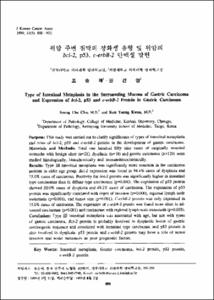위암 주변 점막의 장화생 유형 및 위암의 bcl-2, p53, c-erbB-2 단백질 발현
- Keimyung Author(s)
- Kwon, Kun Young
- Department
- Dept. of Pathology (병리학)
- Journal Title
- 대한암학회지
- Issued Date
- 1999
- Volume
- 31
- Issue
- 5
- Abstract
- Purpose: This study was carried out to clarify significance of types of intestinal metaplasia and roles of bcl-2, p53 and c-erbB-2 protein in the development of gastric carcinoma. Materials and Methods: Total one hundred fifty nine cases of surgically resected stomachs with benign ulcer (n=21), dysplasia (ns18) and gastric carcinoma (n=120) were studied histologically, histochemically and immunohistochemically. Results: Type III intestinal metaplasia was significantly more common in the carcinoma patients in older age group. Bcl-2 expression was found in 94.4% cases of dysplasia and 75.0% cases of carcinoma. Positivity for bcl-2 protein was significantly higher in intestinal type carcinomas than in diffuse type carcinomas (p=0.000). The expression of p53 protein showed 50.0% cases of dysplasia and 49,2% cases of carcinoma. The expression of p53 protein was significantly correlated with depth of invasion (p=0.000), regional lymph node metastasis (p=0.001)» and tumor size (p=0.001). C-erbB-2 protein was only expressed in 15.0% cases of carcinoma. The expression of c-erbB-2 protein was found more often in advanced carcinomas (p=0.001) and carcinomas with regional lymph node metastasis (p=0.003). Conclusion: Type III intestinal metaplasia was associated with age, but not with types of gastric carcinoma. Bcl-2 protein is probably involved in dysplastic lesion of gastric carcinogenic sequence and associated with intestinal type carcinoma, and p53 protein is also involved in dysplasia. p53 protein and c-erbB-2 protein may have a role of tumor invasion and nodal metastasis as poor prognostic factors.
- Alternative Title
- Type of Intestinal Metaplasia in the Surrounding Mucosa of Gastric Carcinoma and Expression of bcl-2, p53 and c-erbB-2 Protein in Gastric Carcinoma
- Keimyung Author(s)(Kor)
- 권건영
- Publisher
- School of Medicine
- Citation
- 조승제 and 권건영. (1999). 위암 주변 점막의 장화생 유형 및 위암의 bcl-2, p53, c-erbB-2 단백질 발현. 대한암학회지, 31(5), 898–911.
- Type
- Article
- ISSN
- 0496-6872
- Appears in Collections:
- 1. School of Medicine (의과대학) > Dept. of Pathology (병리학)
- 파일 목록
-
-
Download
 oak-bbb-02764.pdf
기타 데이터 / 1.08 MB / Adobe PDF
oak-bbb-02764.pdf
기타 데이터 / 1.08 MB / Adobe PDF
-
Items in Repository are protected by copyright, with all rights reserved, unless otherwise indicated.